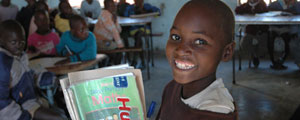
The socio-economic crisis that hit the country during the lost decade after the turn of the millennium, did not spare the country’s schools where availability of learning materials, especially textbooks, became problematic, consequently affecting pupils.
Report by Victoria Mtomba
In most schools, especially those in rural outposts, students had to share whatever scarce resources were available, with at least 10 pupils having to share one textbook.
In 2011, however, the United Nation’s Children Fund (Unicef) came on board with a donation of 22 million textbooks meant to benefit over 8 000 schools in the country. Before then, students were sharing books at a textbook-to-pupil ratio of 1:10.
The situation has changed as a number of schools are now having a textbook-to-pupil ratio of 1:1, although in some schools the situation has not changed. Indications are that some of the books released by Unicef did not reach target schools.
An official from one school in Masvingo said although they had been made to understand they would receive complete sets of textbooks for Form 1 to 4, they only received those for Form 1 and 2.
He said they made enquiries regarding the discrepancies, but had not been able to make headway.
“We did not receive books for Form 3 and 4. “When we submitted our requirements as a school the Form 3 and 4 textbooks were also on the list. “I understand we are not the only school that experienced that problem. Some schools in the district also had a similar problem,” the official said.
- Chamisa under fire over US$120K donation
- Mavhunga puts DeMbare into Chibuku quarterfinals
- Pension funds bet on Cabora Bassa oilfields
- Councils defy govt fire tender directive
Keep Reading
The Progressive Teachers’ Union of Zimbabwe (PTUZ) president Takavafira Zhou said the union conducted a survey in schools last year on books that were donated by Unicef and it revealed that some schools in the education sector received 20% of allocated books. Zhou said the PTUZ embarked on a survey in Midlands, Masvingo and Mashonaland, Mberengwa, Zvishavane, Chiundura, Lower Gweru, Gokwe and Mwenezi.
“Our survey showed that there are schools that received 20% and some 90% of the allocated books from Unicef. There were also schools that received as little as 10%. Madamombe Government High did not receive textbooks for Form 3 and 4,” Zhou said.
He said Sugarmina School in Lower Gweru had 30% of textbook delivered, Mkoba Primary School in Gweru received 25% and Chiundura Primary School had 65% of the books they required delivered.
“In remote areas we realised that there was a 20% shortage in the delivery of textbooks. The survey also revealed that leakages of books occurred before the distribution of the books was done. Some of the books were not stamped on,” Zhou said.
He said on the issue of how PTUZ reached the percentages for leakages, the union made a request from various schools to state the number of books that the schools previously required.
Zhou said leakages in textbooks could just be a tip of an iceberg as massive corruption, which he said was now rife in the education sector, could not be ruled out.
He said there were issues to do with incentives that were not standardised. Some teachers were receiving $50, $100, $150 as incentives depending on individual school.
“There is no transparency between the headmasters, teachers and parents on the incentives, which leave room for corruption and leakages,” he said.
An insider at Unicef, who confirmed that a total of 22 million books were sourced to cover the needs of 8 000 schools in the country, admitted that they had been leakages which were yet to be accounted for.
“We did not have any major leakages as only 240 000 books were lost and the rest of the books reached their final destination,” the source said, adding that the books had 72 titles.
Contacted for comment yesterday Education, Sport, Arts and Culture deputy minister Lazarus Dokora said he was not aware of the leakages. “I am not aware of that. What I am aware of is that the books reached their final destination,” he said.











